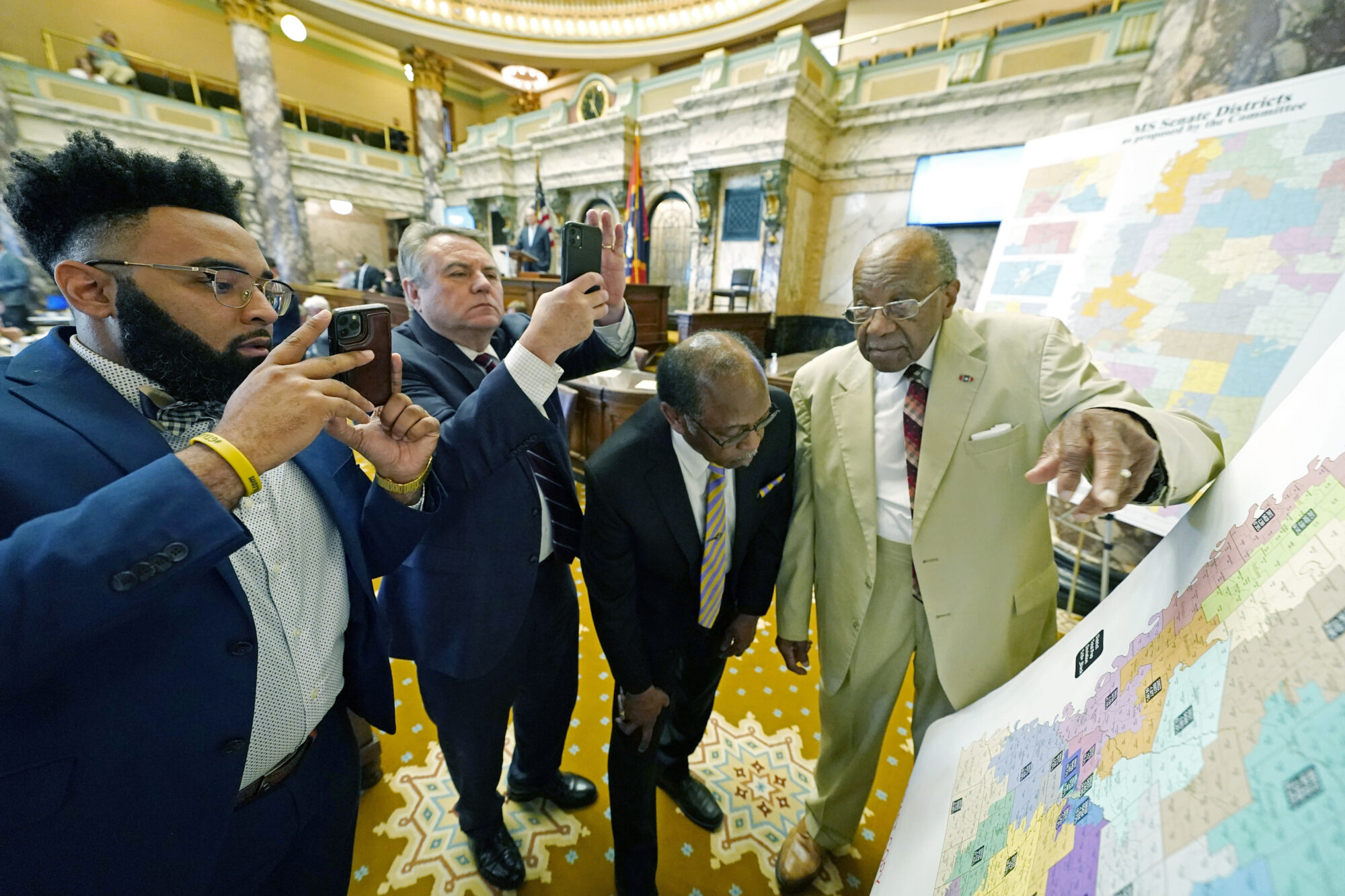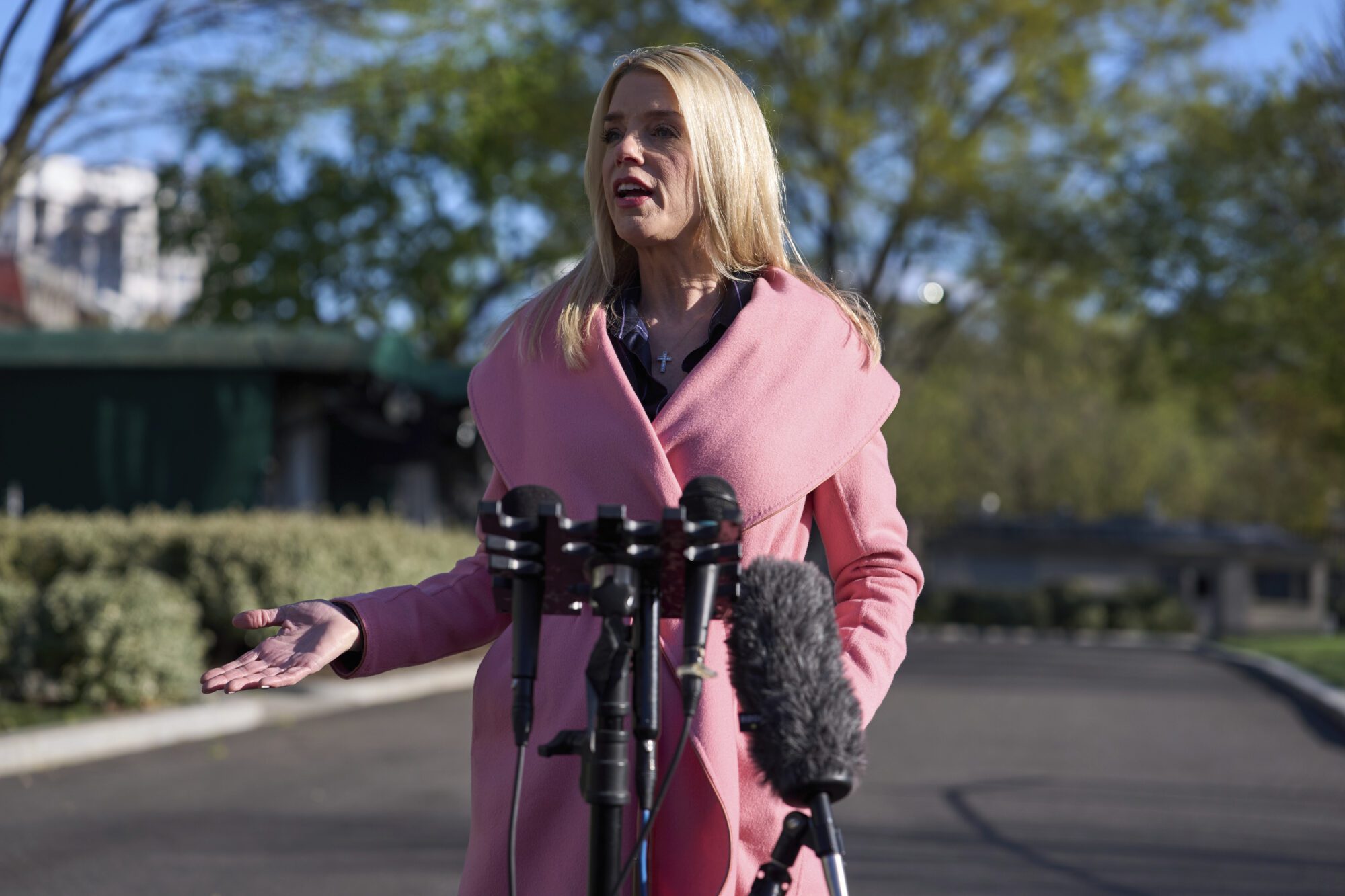
FILE - Mississippi state Sens. Rod Hickman, D-Macon, left, Michael McLendon, R-Hernando, second from left, Albert Butler, D-Port Gibson, and David Jordan, D-Greenwood, review an alternate Senate redistricting map at the Mississippi Capitol in Jackson, Miss., March 29, 2022. Three federal judges ruled Tuesday, July 2, 2024, that Mississippi legislators must redraw some state House and Senate districts because the districts adopted in 2022 dilute Black voting power. (AP Photo/Rogelio V. Solis, File)
- A federal three-judge panel has given Election Commissioners seven days to submit a new redistricting plan in the DeSoto County area.
Late Tuesday evening, the federal three-judge panel reviewing the Mississippi Legislature’s latest attempt at redrawing legislative districts ordered the State Board of Election Commissioners to propose a new map for the DeSoto County area in seven days.
Attorney General Lynn Fitch (R), Governor Tate Reeves (R), and Secretary of State Michael Watson (R) make up the Board of Election Commissioners.
“The timeline for that is tight,” the panel wrote. “We remain committed to special elections in November.”
Under the adopted legislation, the qualifying period for the 15 special legislative elections caused by the redistricting plan is set to begin May 19. Primary Elections would then be held August 5, with a General Election set for November 4.
The court noted that it may be forced to order a revised pre-election schedule.
The order comes after the judicial panel, which consists of U.S. Fifth Circuit Judge Leslie Southwick and U.S. District Judges Sul Ozerden and Daniel Jordan, heard arguments from attorneys representing Mississippi and the state NAACP last week regarding the newly adopted legislative district boundaries.
Lawmakers adopted the revised boundaries this session in an attempt to comply with the court ordered redistricting, namely in DeSoto and Chickasaw counties as well as in the Hattiesburg-Forrest County area, after the Mississippi NAACP filed a lawsuit challenging the 2022 legislative redistricting plan claiming black voting strength had been diluted.
The result was the need to hold 15 special elections in the affected areas.
Last week, the NAACP argued that those new maps do not do enough to satisfy their complaint and asked the court to consider changes in the Chickasaw and DeSoto counties. The plaintiffs did not object to the changes made in the Hattiesburg-Forrest County area.
The black voting age population (BVAP) adjustments made by the Legislature, as noted by the court, in the DeSoto County area resulted in the following changes:
- Senate District 1 – up from 24.72% to 52.5%
- Senate District 2 – down from 32.02% to 25.0%
- Senate District 10 – down from 29.3% to 28.4%
- Senate District 11 – down from 61.23% to 50.9%
- Senate District 19 – down from 24.69% to 24.0%
On Tuesday, the court said that while the remedial Senate districts in the DeSoto County “fail to remedy the Section 2 violation,” the House redistricting maps in that area as well as in the House and Senate maps in the Pine Belt were accepted.
State Senator Michael McLendon (R) of District 1 in DeSoto County strongly voiced his opposition to the Senate redistricting plan in his area during the session. He presented an alternative map to the body, which was overwhelmingly voted down in the chamber.
McLendon told Magnolia Tribune Tuesday night, “Turns out, my map, and my warning about how this redistricting would hurt DeSoto County, were spot on.”
“People (and even judges) are finally seeing it,” McLendon said. “Let’s hope the new map is not a repeat of the last one. And this is exactly why we need real fighters in office.”
Senate Democratic Leader Derrick Simmons also offered an amendment to the Senate leadership proposal. His amendment sought to increase the black voting age population in the newly created DeSoto County district without pairing two incumbent senators. Like McLendon’s amendment, Simmons’ overwhelmingly failed after Senate Rules Chairman Dean Kirby (R) voiced opposition.
The DeSoto County Board of Supervisors were also contesting the new districts in their area over “the potential adverse impact” the maps would have on their voters. Yet, the court noted that they considered Desoto County’s arguments but declined to address them because they would not alter this result.
You can read the full judicial panel order below.











